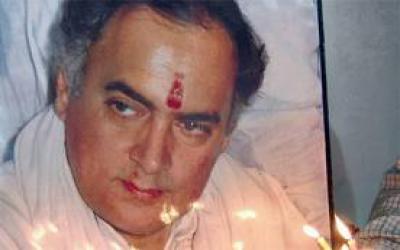
New Delhi, October 30: The chief investigating officer of the Rajiv Gandhi assassination case, K Ragothaman, has alleged that the then IB chief, M K Narayanan, had "suppressed a vital piece of evidence": a video tape showing "human bomb" Dhanu at the Sriperumbudur venue prior to the former prime minister's arrival.
In a book authored by him, Ragothaman said that although a "preliminary enquiry" had been conducted in connection with the missing video, Narayanan, who is now West Bengal governor, had been "allowed to go scot-free" by the chief of the special investigation team (SIT), D R Karthikeyan.
The just-published book, "Conspiracy to kill Rajiv Gandhi - From CBI files", claims that the tape, which had been taken from the videographer by IB the day after Rajiv Gandhi had been blown by Dhanu on May 21, 1991, was never shared with SIT in the investigation of the assassination.
Ragothaman wrote, "The assassin gang as per our investigation was very much in the sterile zone for more than two and half hours waiting for its target." The suppression of the video evidence helped the Tamil Nadu police get away with the claim that Dhanu had sneaked into the sterile zone after Rajiv Gandhi's arrival at the venue around 10 pm.
The tape recovered by the Tamil Nadu police was found to have interpolations in the form of Doordarshan's news bulletins about the assassination. Ragothaman therefore asserted that the tape taken by the IB officials was "the original one and that the video given to the local police was a substituted one".
The alleged manipulation, according to Ragothaman, was meant to erase video evidence of the kind of people Dhanu had interacted with at the venue, thereby sparing embarrassment to the Congress party in the middle of the 1991 Lok Sabha election. He asked: would Narayanan have dared "to damage the goal of the Congress party, irrespective of his personal affiliation to Rajiv Gandhi's family?"
Though he was formally in charge of the investigation and was therefore in the witness box for 67 days, Ragothaman wrote that he had not been taken into confidence by his superior Karthikeyan about the recovery of the tape by IB. He came to know about it later through the report of the Justice J S Verma Commission which had probed the security lapses leading to the assassination.
Besides recording "this unusual feature" of the SIT-produced tape containing news bulletins along with visuals of the venue, the commission's report reproduced a letter written by Narayanan on May 22, 1991 to the then Prime Minister, Chandrashekhar, stating that the video of the meeting was being "scanned to try and IDENTIFY THE LADY". The lady referred to in capital letters by Narayanan was of course the assassin.
In a sequel to the commission's report, the Narasimha Rao government directed SIT to hold the preliminary enquiry, case no. 1 of 1995, against Narayanan along with the then cabinet secretary and home secretary, according to the book. The case was later "buried at the behest of the chief of SIT" despite the admission made by Narayanan in his May 22 letter.
While the public got to see only the two still pictures of Dhanu taken by an LTTE-hired photographer who had died in the blast, Ragothaman's book raises questions about the whereabouts of the video in which Narayanan admitted to have seen the assassin. Why did the SIT chief not collect the video seen by the IB chief? Or, why did the IB chief not share the tape in which Dhanu was visible with him? Had there been such questions about anybody else, the book says "he would have been booked under Section 201 IPC for concealing the evidence and screening the offender".





Comments
Add new comment